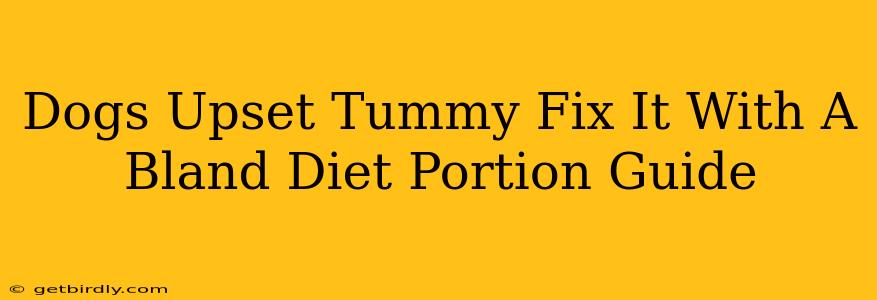Dog's Upset Tummy? Fix It With a Bland Diet (Portion Guide)
Is your furry friend suffering from an upset stomach? Vomiting, diarrhea, loss of appetite – these are all signs that something's amiss with your dog's digestive system. While a quick bout of upset stomach might resolve itself, persistent symptoms warrant a visit to the vet. However, in many cases, a bland diet can help soothe your dog's tummy and get them back on their paws. This guide will explain what a bland diet is, how to prepare it, and provide a portion guide to ensure your dog receives the right amount of food.
What is a Bland Diet for Dogs?
A bland diet for dogs is a simple, easily digestible food regimen designed to rest the digestive tract and promote healing. It typically consists of easily digestible carbohydrates and a lean protein source, minimizing the risk of further irritation. The goal isn't to provide complete nutrition long-term, but rather to provide relief during an episode of gastrointestinal upset. Think of it as a gentle reset button for your dog's system. Common ingredients include boiled chicken breast (without skin and bones) and plain, cooked white rice. Avoid any added seasonings, spices, or oils.
Why Use a Bland Diet?
Several reasons justify the use of a bland diet for digestive upset in dogs:
- Reduced Irritation: Bland diets minimize the burden on the digestive system, reducing inflammation and irritation caused by more complex foods.
- Improved Digestion: The simple ingredients are easier for the body to break down and absorb, reducing the strain on the digestive tract.
- Rehydration: A bland diet can help replace lost fluids and electrolytes, crucial during episodes of vomiting and diarrhea.
- Temporary Nutritional Support: While not a complete diet, it provides essential nutrients while the digestive system recovers.
What Foods to Avoid During an Upset Stomach?
- Fatty Foods: Rich foods are difficult to digest and can exacerbate symptoms.
- Spicy Foods: Avoid any foods with spices, seasonings, or onions.
- Dairy Products: Many dogs are lactose intolerant, and dairy can worsen diarrhea.
- Processed Foods: Processed dog food, treats, and table scraps should be avoided.
- Bone-in Meat: Bones can cause choking hazards and digestive blockages.
How to Prepare a Bland Diet for Dogs
The standard bland diet consists of boiled chicken and plain white rice. Here's a step-by-step guide:
- Boil the Chicken: Boil boneless, skinless chicken breast until fully cooked. Shred or chop finely once cooled.
- Cook the Rice: Cook plain white rice according to package directions until tender. Avoid adding any butter or seasonings.
- Combine: Mix the cooked chicken and rice in a bowl.
Bland Diet Portion Guide for Dogs
The amount of bland diet you feed your dog will depend on its size, weight, and the severity of its digestive upset. Always consult your veterinarian for specific recommendations. However, a general guideline is as follows:
- Small Dogs (under 10 lbs): 1/4 cup to 1/2 cup of the mixture, divided into several small meals throughout the day.
- Medium Dogs (10-30 lbs): 1/2 cup to 1 cup of the mixture, divided into several small meals throughout the day.
- Large Dogs (over 30 lbs): 1 cup to 1.5 cups of the mixture, divided into several small meals throughout the day.
How Long Should I Feed My Dog a Bland Diet?
Typically, a bland diet is fed for 2-3 days, or until your dog's symptoms improve. Do not exceed this without veterinary guidance. Once your dog's stool returns to normal and appetite is restored, gradually reintroduce their regular food, mixing it with the bland diet over several days. Monitor their reaction carefully. If symptoms return, revert back to the bland diet and consult your vet.
When to See a Veterinarian
While a bland diet can be helpful in managing mild digestive upset, it's crucial to contact your veterinarian if:
- Your dog's symptoms persist for more than 2-3 days.
- Your dog is lethargic, dehydrated, or showing signs of severe illness.
- Your dog is vomiting blood or has bloody diarrhea.
- You notice any unusual changes in your dog's behavior or appetite.
A bland diet is a temporary measure to soothe your dog's tummy, not a long-term solution. Always prioritize veterinary care for any persistent or severe digestive issues. Regular check-ups and preventative care are also essential for maintaining your dog’s overall health.

